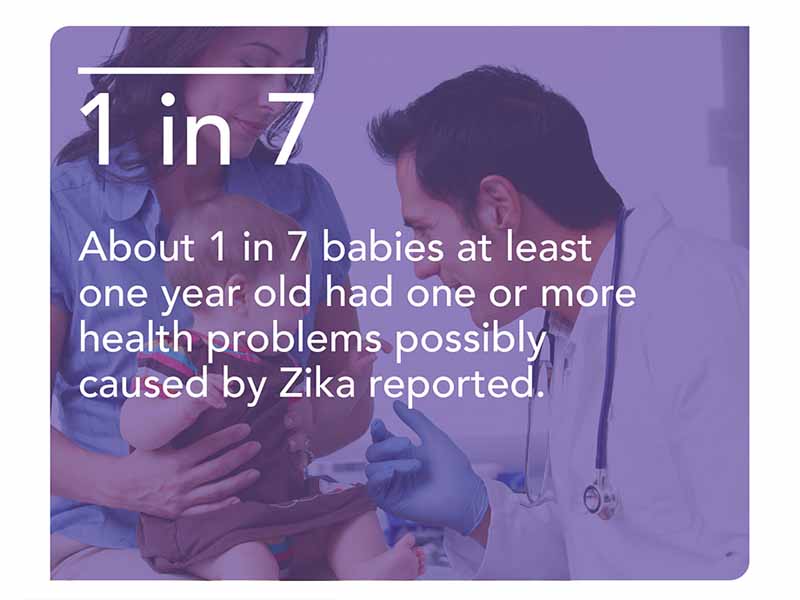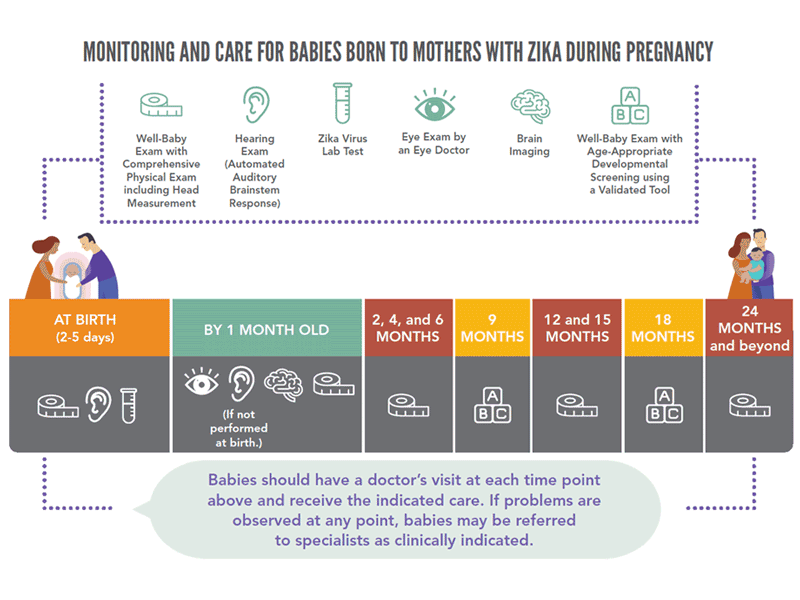Children Exposed to Zika in Utero Need Long-term Monitoring
CDC Says These Infants May Have Lingering Health Problems
August 17, 2018, 09:57 am News Staff – About one in seven children age 1 or older who were born to women with Zika virus infection during pregnancy have one or more health problems possibly caused by in utero exposure to the virus.
That's according to a CDC Morbidity and Mortality Weekly Report (MMWR) and related Vital Signs report released Aug. 10.
"We know that Zika virus infection during pregnancy can cause serious health problems in babies, such as birth defects and vision problems, including conditions not always evident at birth," said CDC Director Robert Redfield, M.D., in a news release. "We are still learning about the full range of long-term health problems these babies could face. We thank clinicians for their continued commitment to conduct all necessary tests and evaluations to ensure appropriate care."
Zika Infection by the Numbers
More than 4,800 pregnancies from U.S. territories and freely associated states that had laboratory results showing possible or confirmed Zika virus infection were reported to the U.S. Zika Pregnancy and Infant Registry (USZPIR) from 2016-2018.

Courtesy of CDC/Vital Signs
Of these cases, 1,450 infants who reached age 1 or more by Feb. 1, 2018, had some follow-up care reported to the USZPIR after their first 14 days of life. Among these children, 95 percent had at least one physical exam at that point, 76 percent had developmental screening or evaluation, 60 percent had postnatal neuroimaging, and 48 percent had automated auditory brainstem response-based hearing screen or evaluation. Ophthalmic examination was reported in 36 percent of the children.
Among all the children with reported follow-up care, 6 percent had at least one Zika-associated birth defect identified, 9 percent had at least one neurodevelopmental abnormality possibly associated with congenital Zika virus infection identified, and 1 percent had both. Overall, about one in seven children had health problems possibly caused by Zika reported.
Story Highlights
The CDC recommends that all infants born to mothers with Zika virus infection during pregnancy receive a variety of screenings and care even if they appear healthy at birth. This includes providing recommended pediatric follow-up care and referrals, including early intervention services.
The researchers noted that many of the children assessed didn't receive all recommended screening for health problems potentially related to Zika virus. Following the recommended screenings and care for these babies is important, the CDC stated, to help ensure early identification of health problems and timely referral to services.
The agency also offered reminders that family physicians can use during visits with mothers and their children, including:
- Ask every mother about possible Zika exposure during pregnancy, even if her baby appears healthy;
- Share Zika test results with all health care professionals working with both mother and baby; and
- Report health information about babies and young children affected by Zika during pregnancy to their state, local or territorial health department, even if they appear healthy.
Threat Continues in United States
Although there have been fewer cases of infection in the past couple of years, Zika virus still poses a risk for pregnant women and their infants, said CDC officials.
In addition to the 4,800 pregnancies in the U.S. territories and freely associated states described earlier, the CDC said nearly 2,500 pregnancies in the United States had laboratory results showing possible or confirmed Zika virus infection.
Zika virus can be transmitted through the bite of an infected mosquito, from a pregnant woman to her developing baby, via sex or through blood transfusion. According to the CDC, most cases of infection in the United States came from mosquito bites that happened during travel to areas with risk of Zika.
The agency noted that there currently are no areas with local mosquito-borne Zika virus transmission in the continental United States. Still, Zika virus transmission continues in many areas, with nearly 100 countries and territories still having active risk of Zika.
"For this reason, the CDC continues to urge pregnant women not to travel to areas with risk of Zika and recommends that men and women who travel to an area with risk of Zika wait before trying to conceive," the agency said in the news release.

New Guidance for Pregnancy After Zika Exposure
The Aug. 10 MMWR included updated CDC guidance for couples planning to become pregnant after possible exposure to Zika virus.
The CDC now recommends that men with possible Zika virus exposure who are planning to conceive wait for at least three months after symptom onset (if symptomatic) or their last possible Zika virus exposure (if asymptomatic) before engaging in unprotected sex.
Additionally, the agency now recommends that for couples who are not trying to conceive, men can consider using condoms or abstaining from sex for at least three months after symptom onset (if symptomatic) or their last possible Zika virus exposure (if asymptomatic) to minimize their risk for sexual transmission of Zika virus.
These updated recommendations are based on emerging data, which suggest that risk of infectious Zika virus in semen appears to decline substantially during the three months after onset of symptoms, the CDC said.
Note: All other Zika guidance remains unchanged.
The definition of possible Zika virus exposure remains unchanged and includes travel to or residence in an area with risk for Zika virus transmission, as well as sex without a condom with a partner who traveled to or lives in an area with risk for Zika virus transmission.
The CDC said it will continue to update recommendations as new information becomes available.
Related AAFP News Coverage
Illnesses From Mosquito, Tick and Flea Bites Triple
(5/8/2018)
Guest Editorial
Cutting Global Health Programs Puts Americans at Risk
(2/22/2018)
Local Zika Transmission in U.S. Tied to Rise in Birth Defects
(1/30/2018)